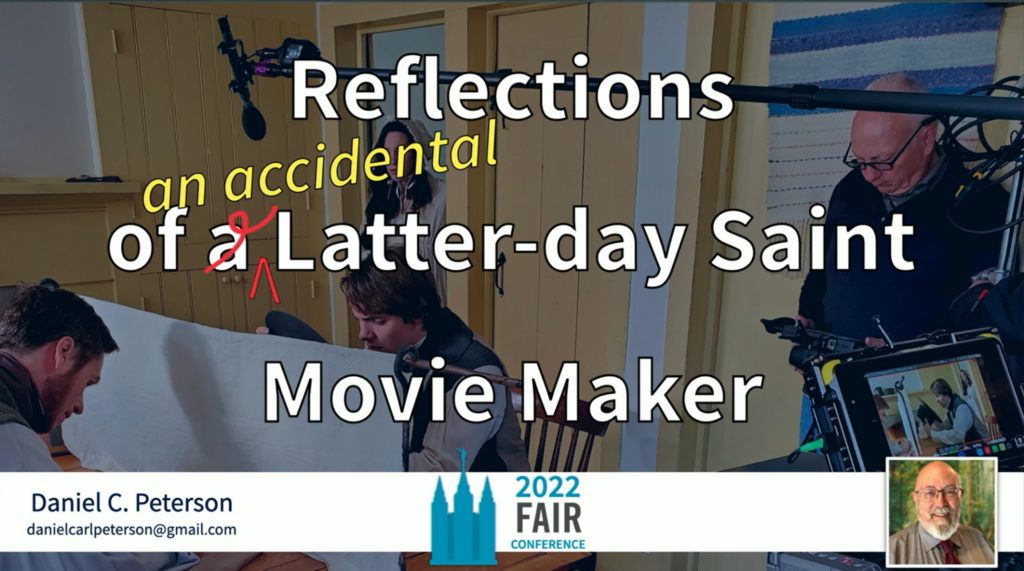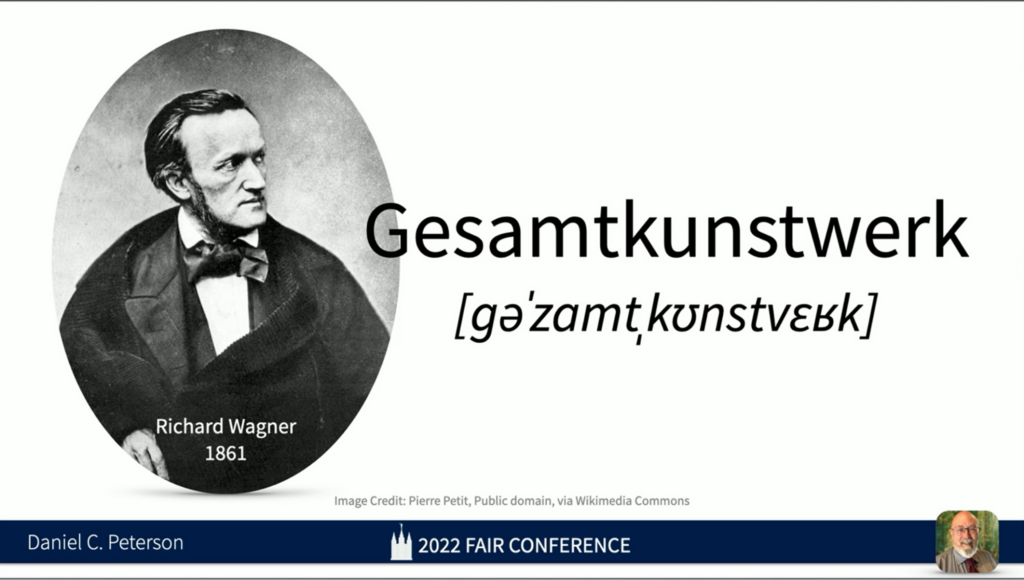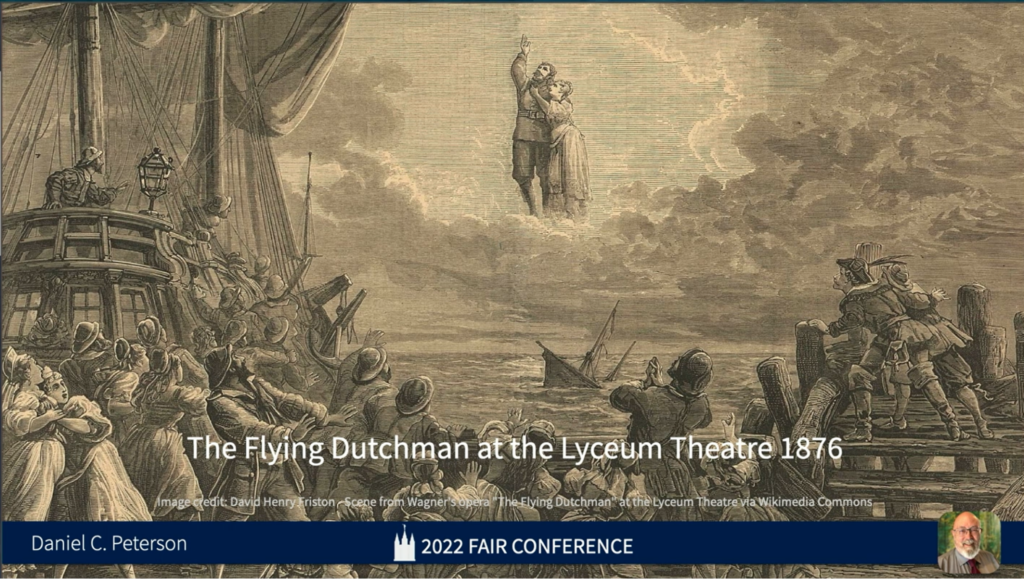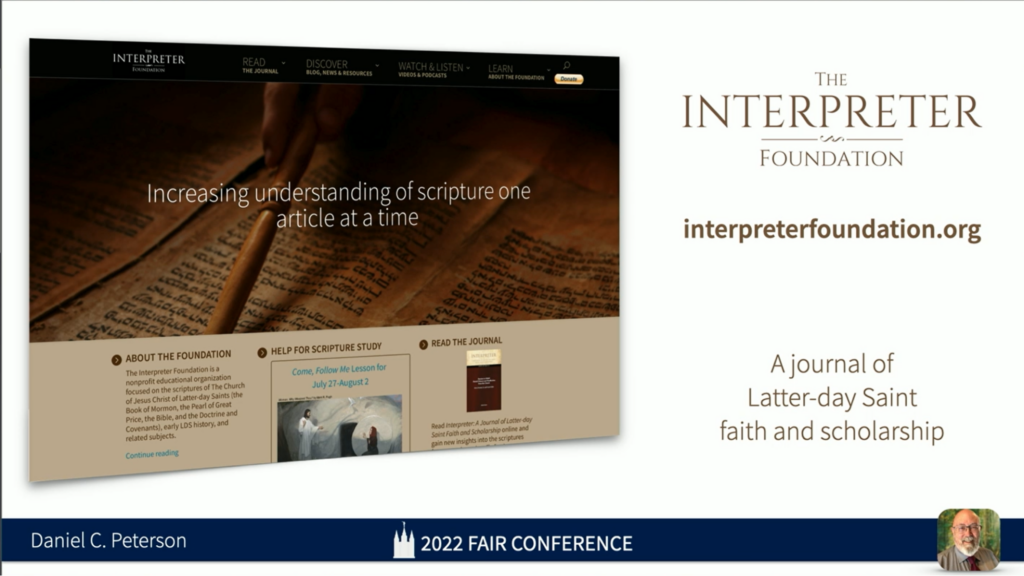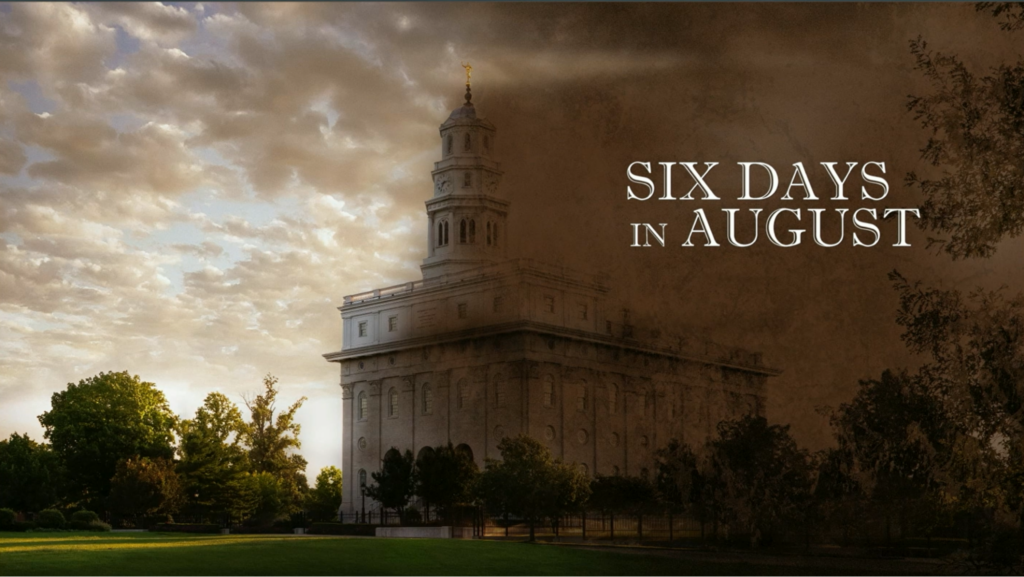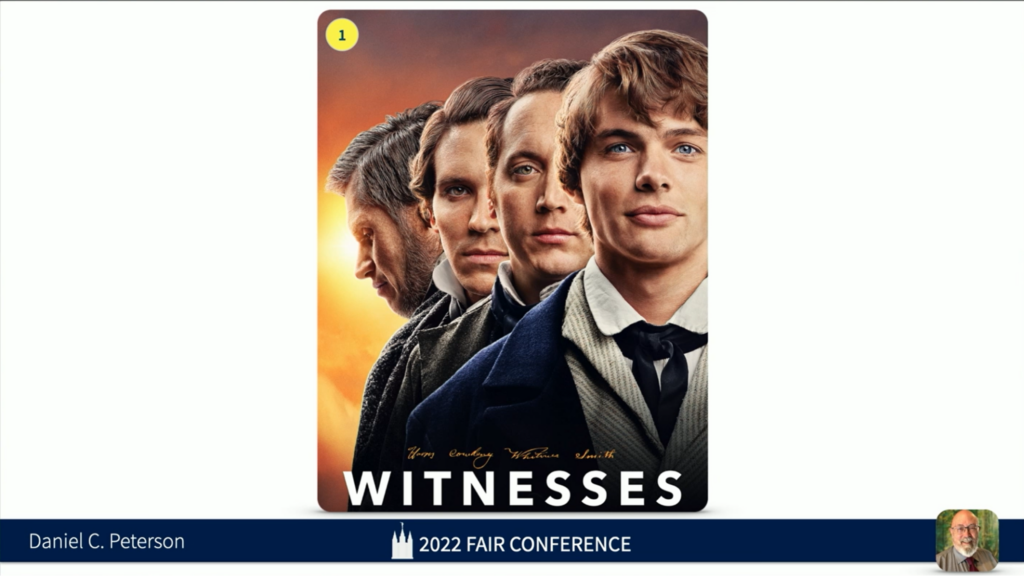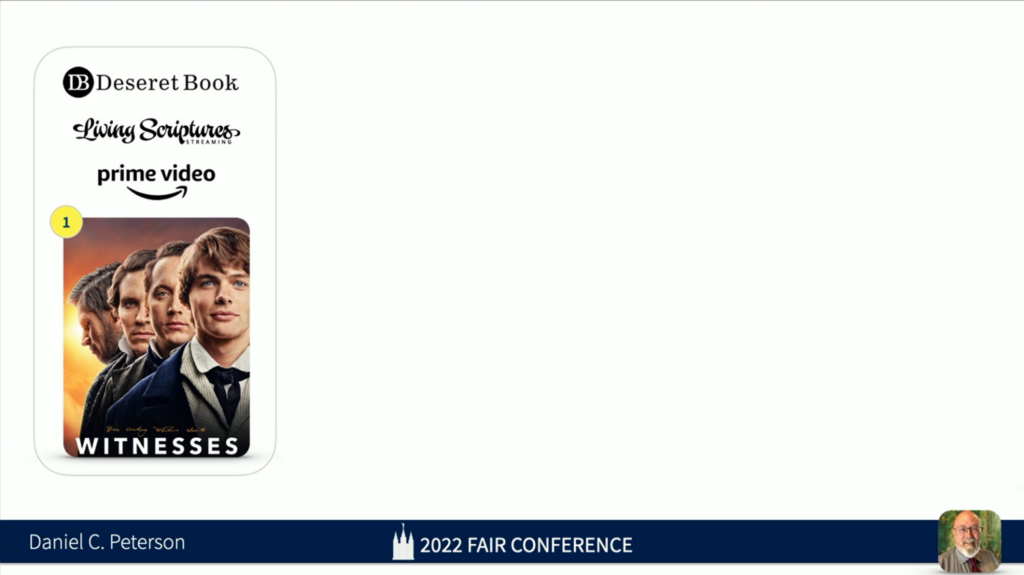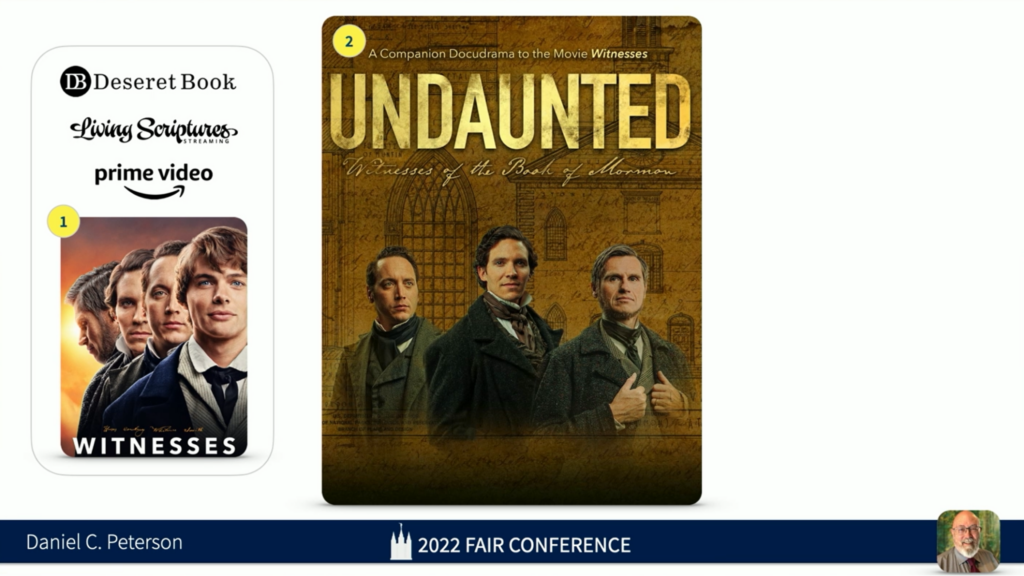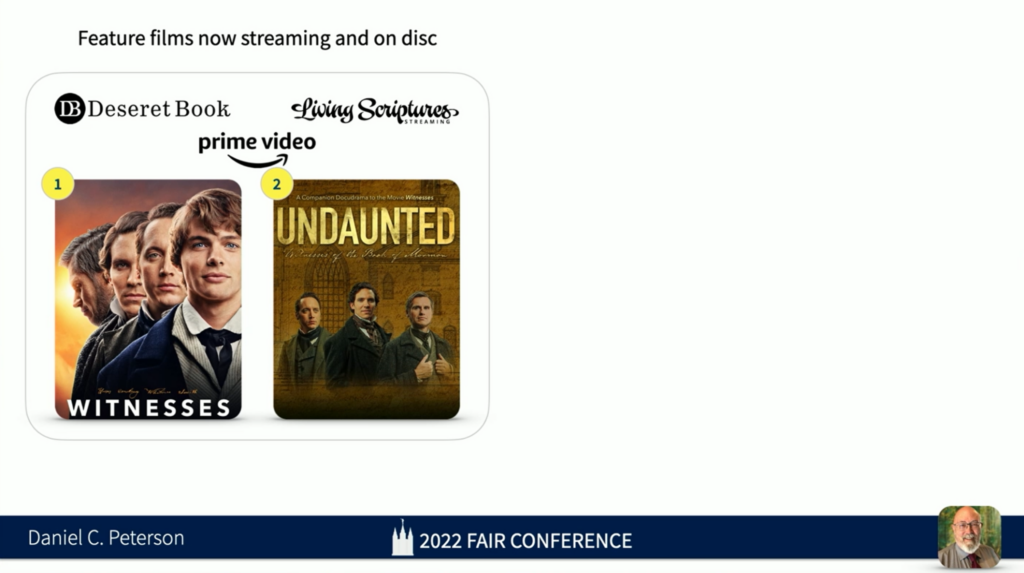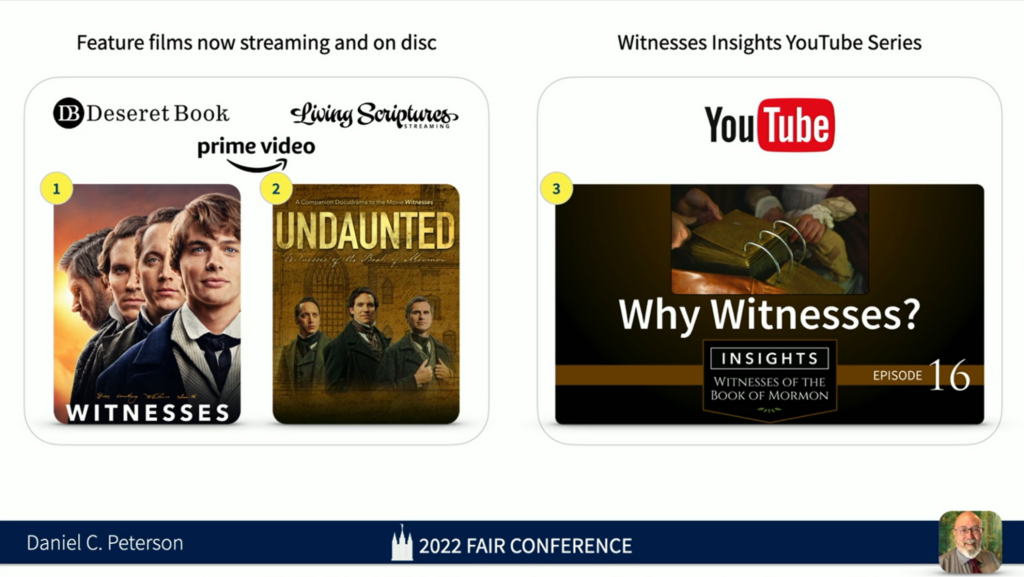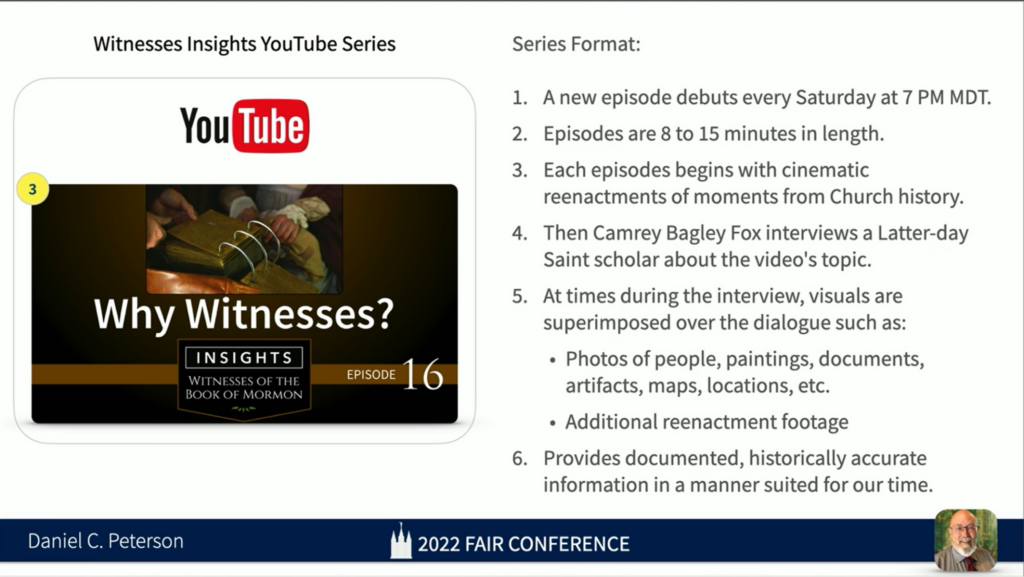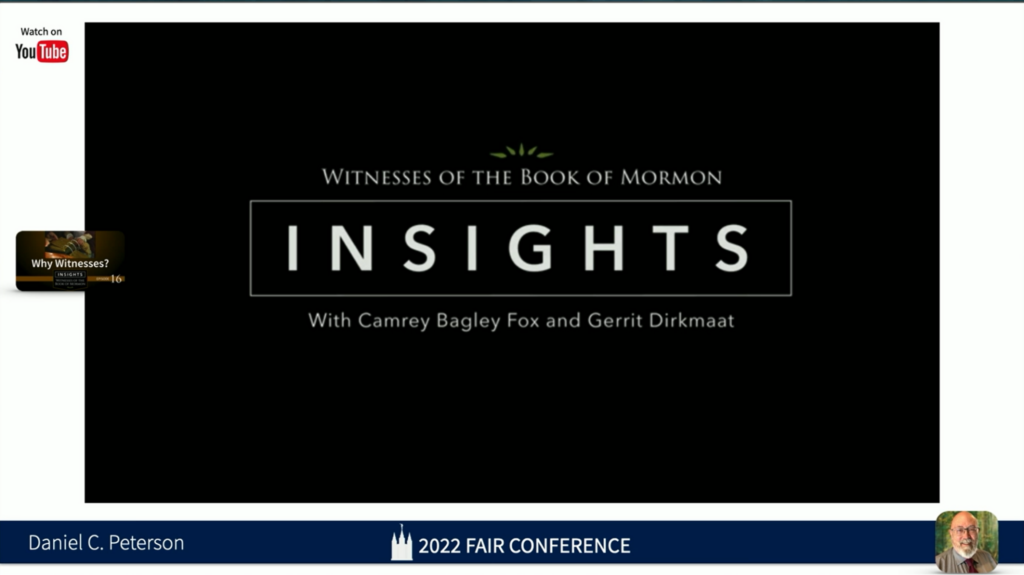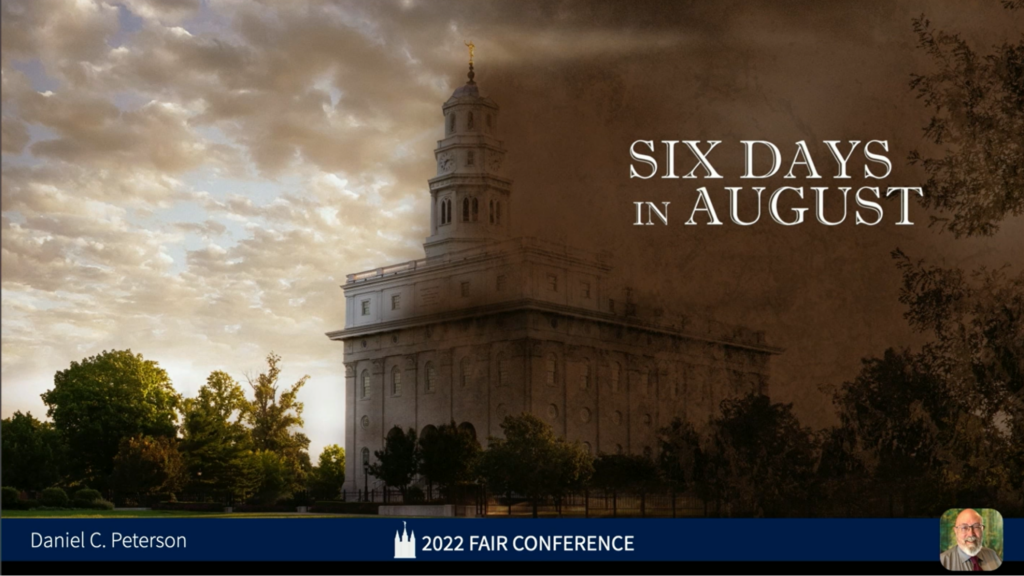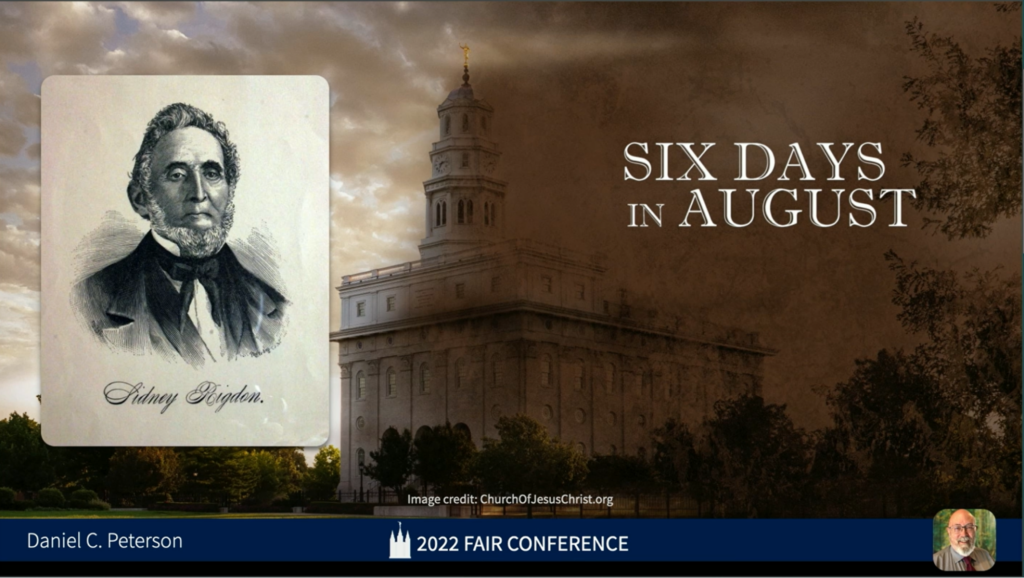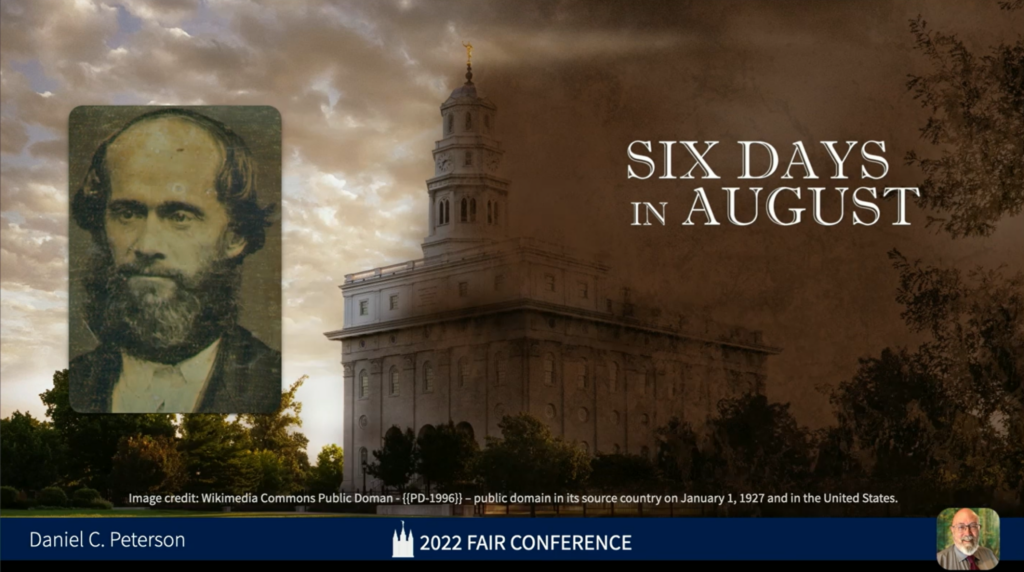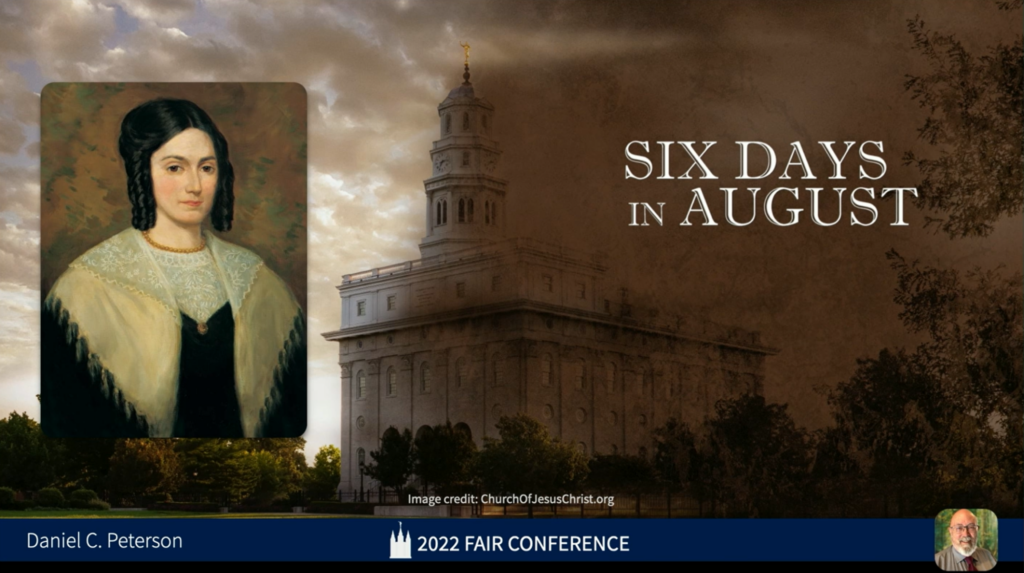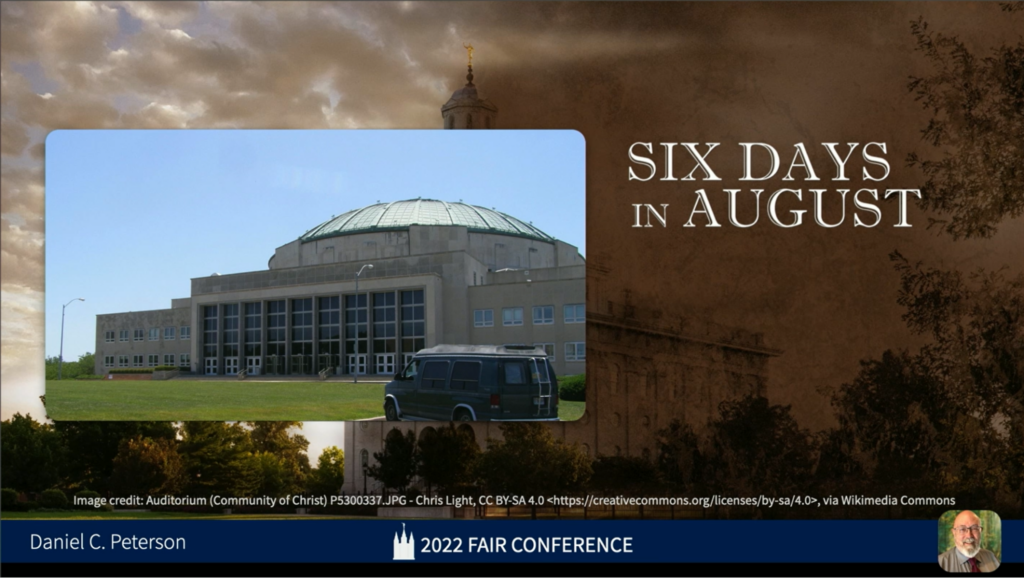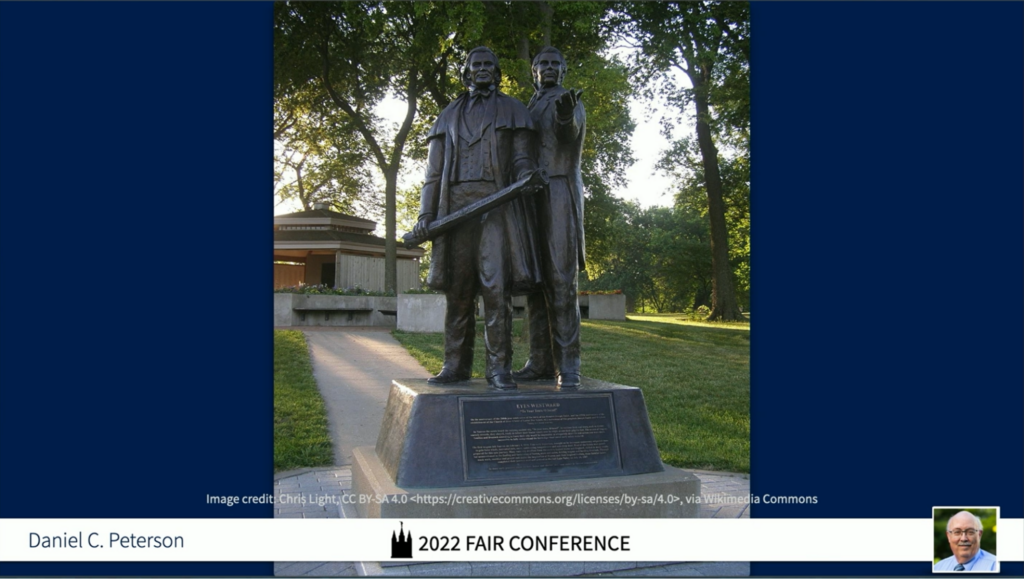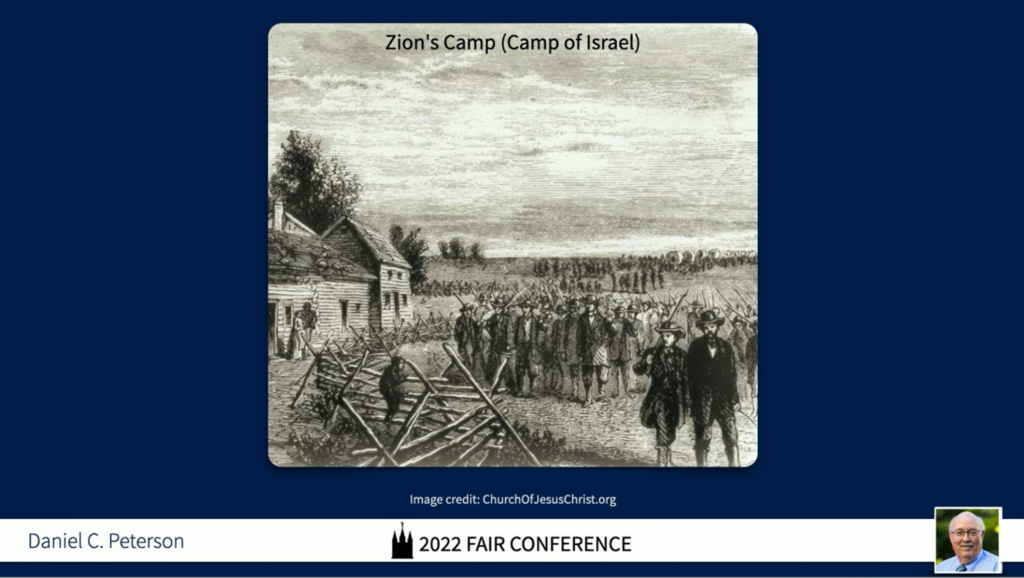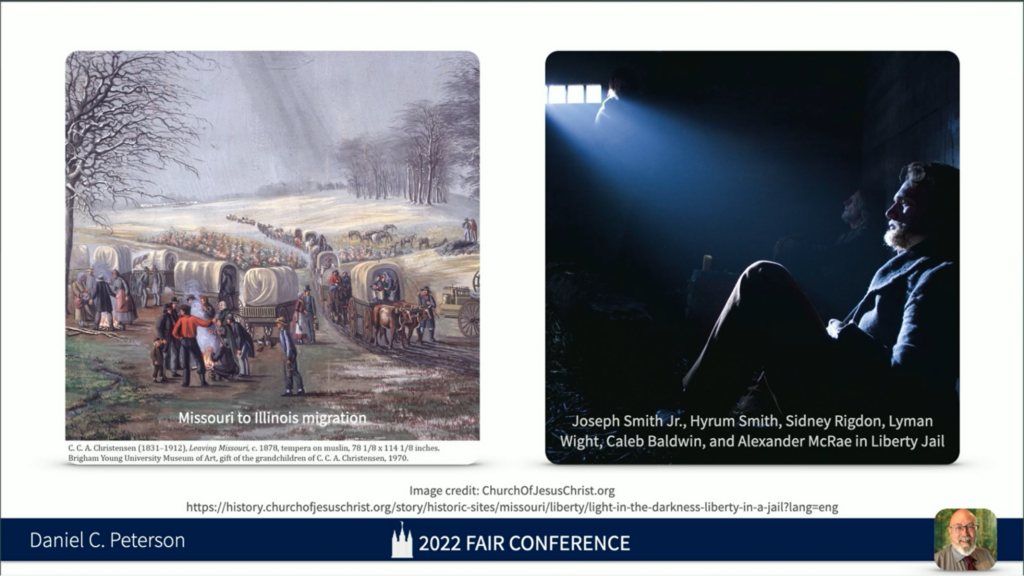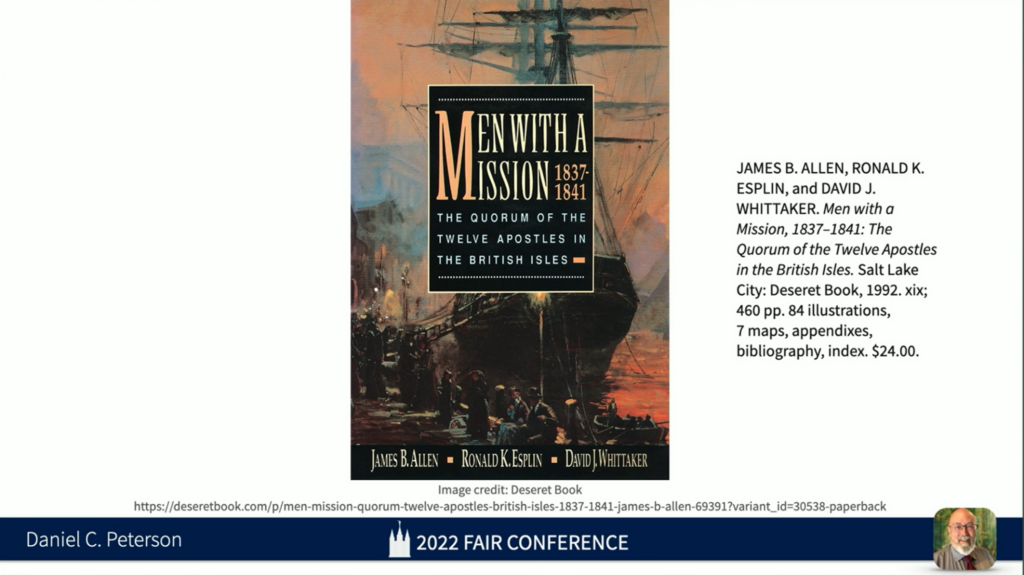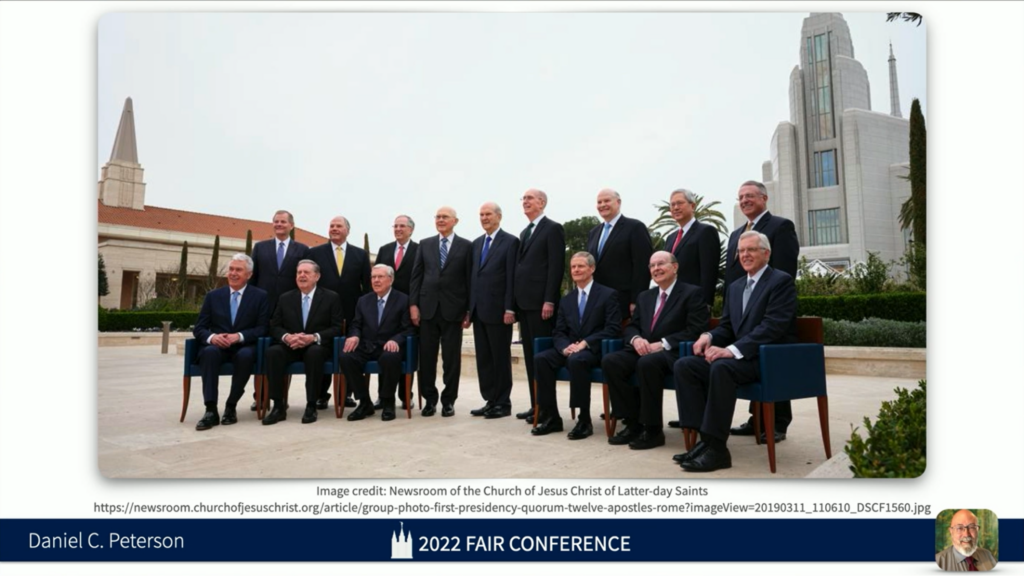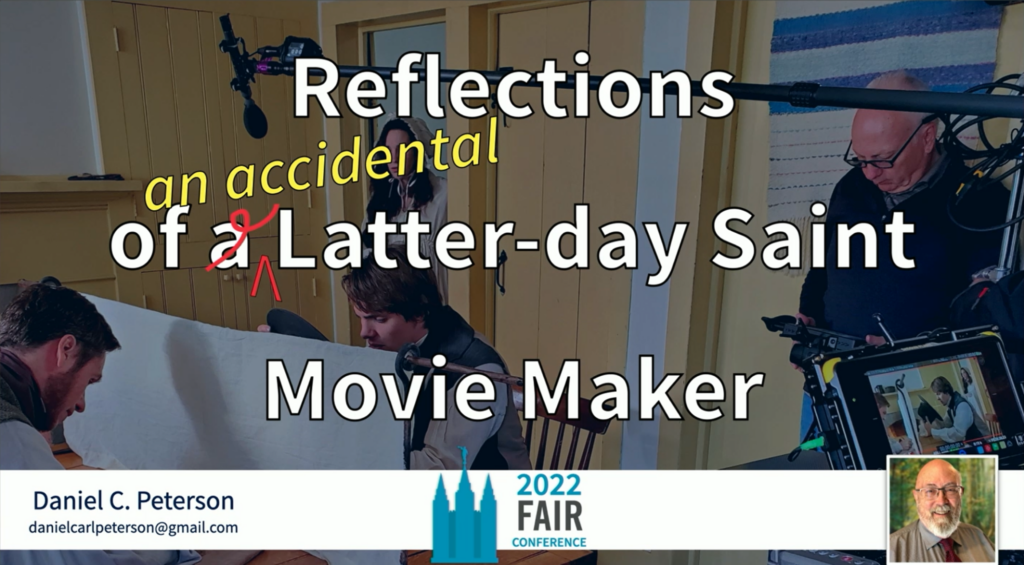Reflections of a Latter-day Saint Movie Maker” features insights from Dan Peterson discussing his experiences and challenges, particularly in producing the Witnesses movie and docudrama, and overall creating content that aligns with Latter-day Saint values. He reflects on the importance of storytelling, the impact of media on faith, and the balance between creativity and religious principles. The discussion includes personal anecdotes and advice for aspiring filmmakers within the Latter-day Saint community.
This talk was given at the 2022 FAIR Conference, on August 5, 2022.

Dan Peterson, President of The Interpreter Foundation and longtime speaker at FAIR, shares his journey into Latter-day Saint filmmaking, discussing the creation of Witnesses and Undaunted, the role of media in faith, and upcoming projects.
Transcript
Dan Peterson
How I got into the Movie-Making Business
Well, I’ve long had an interest in film. I really enjoyed Barrett Burgin’s presentation. I was originally going to title this, (of course, I can’t do it with President Nelson’s admonition) but I was going to call it ‘Confessions of a Mormon Movie Mogul.’ I really intended to come up here with bling. I wanted to arrive in a Lamborghini, but it’s just the old SUV, a minivan with 200,000-plus miles on it, so not very glamorous. It was an error in the
But yeah, when I was at BYU, I remember taking a one-hour evening class just seeing old classic films. This is back in the days before you could just get a video or look on Netflix or something. So to see some of these old films like On the Waterfront, The Magnificent Ambersons, or How Green Was My Valley, some of the old classic black and white films, I really enjoyed. It was a revelation to me, and I would regularly attend the BYU Film Society where they’d get old films out and show them. Somehow this must be genetic. At least two of my sons are cinephiles. One of them used to write movie reviews for the Deseret News, except he couldn’t make any money at it, and the other is a real authority, almost obsessive on film music. So that movie interest goes back a long way.
Interest
This is kind of surprising to find myself in this role. I hadn’t anticipated it, but the interest goes back in a lot of ways, and one of the ways is connected with a man by the name of Richard Wagner, who was, I will say right up front, a real piece of work. He was not a good guy, and despite that, I’m interested in, or some of my critics would say it’s probably because he was such a bad guy that I’m interested in him.
Richard Wagner
But he had a concept of something he called one of these typically long, multisyllabic German words, which means a total work of art, a comprehensive work of art or something like that. A synthesis of the arts is another way it’s been expressed, an all-embracing art form that would utilize multiple artistic media to convey its meaning. He thought of Opera in his day, the 19th century, as the perfect example of a ‘gesamtkunstwerk.’ It was a combination of poetry and lyrics, music, dramatic acting, scenic set design, all of those things together with painting and even sculpture. In fact, he even tried to bring architecture into the mix with his own theater, the Bayreuth Festspielhaus, the Bayreuth Festival Theater, which is dedicated solely to the performance of his works. So it’s an interesting mind.
He had a tremendous impact on a lot of things in the 19th century. One person that he had an impact on was King Ludwig II of Bavaria. Some of you are familiar with at least his most famous building, one of his three more or less completed castles.
Wagner’s Influence
This is the one at Neuschwanstein in Bavaria. He was the king of Bavaria, and this is the one, of course, that served as the model for the Disney castles at Disneyland and Disney World and elsewhere. He had a huge impact on the 19th century. And later on he had an impact because he was a terrible anti-Semite and because he glorified Germanic Legend and that sort of thing. He had a real powerful influence on Adolf Hitler and the Nazis. I thought seriously of illustrating that, but can you imagine what my critics would make of a scene of me at the Fair Conference standing in front of a swastika banner? I mean, that would never die out on the internet. So knowing how they think, I obviously couldn’t do that.
But I’ve become sort of a Wagnerian, and it sort of shocked me that I’ve attended performances of a lot of his operas.
Wagner’s Works
Parts of The Flying Dutchman, Tannhäuser, Lohengrin, The Meistersinger, and I actually sat through an entire episode of the Ring cycle, four separate operas in San Francisco, and almost completed the four of them in Chicago a few years ago, which is, well, it’s a monument to what the Germans call ‘Sitzfleisch,’ the ability to sit for long periods of time. Anyway, I really like his concept of the ‘gesamtkunstwerk,’ and you can see it again in his idea of Opera.
But I think he would have loved film because film allows you an opportunity to bring in all of those things: music, the script, and the set design, cinematography, and so on. Cinematography would have fascinated him. So my lifelong fascination with the potential of cinema is one of the reasons that I guess, one of the peripheral reasons why I’ve become involved with movie making recently. Wagner thought that the old Germanic mythology deserved treatment in his operas, and I think, even more so, the restored Gospel of Jesus Christ.
Fortunately, I was in a position of being involved with an organization that provided me a sort of institutional framework to do something about it. So, at one point, and the story behind it – maybe I’ll tell it in a minute – the story of how we got involved with doing the Witnesses project is kind of a curious one.
Public Reaction to Witnesses
But I wanted to give you a retrospective on something of the reaction to that film. I might say that I don’t think it’s included in this little collage that we put together, but it has won some awards. It won a feature film award at the LDS Film Festival last year, and it won a Telly Award. Just a couple of weeks ago, it won an award as the best film from the Association for Mormon Letters. So, we’re pleased with the reaction that it’s gotten. Let me just run through this.
[Film excerpt]
David Witmer: Excuse me; I’m looking for Oliver Cowdery.
Joseph Smith: You must be David.
David Whitmer: You have the advantage of me.
Joseph Smith: I’m Joseph.
David Whitmer: You’re Joseph Smith?
Joseph Smith: Come inside; Emma has dinner waiting.
Oliver Cowdery: David!
David Whitmer: Oliver!
Oliver Cowdery: I can’t thank you enough. Hello.
David Whitmer: That was Joseph, the prophet?
[Video Clip]
Hi, my name is Daniel Peterson. I’m the president of The Interpreter Foundation. Now, I didn’t expect to be a filmmaker. I’m recently retired from BYU, where, of all things, I taught Islamic Studies and Arabic. This is not something that I ever expected to go into. Some of you may have heard of the film that we recently did, Witnesses. I hope that some of you will see the docudrama that accompanies it, which is Undaunted: Witnesses of the Book of Mormon, where we talk about not only the three Witnesses but the eight Witnesses, the unofficial witnesses, and involve scholars to comment on those important figures in early Church history who want these stories to be told in a way that will strengthen the faith and the testimonies of, especially, we hope, a younger generation that maybe is not as familiar with these stories as we would like them to be.
ABC 4 News
[ABC 4 News] Interviewer: And from summer travel to summer movies, the new film Witnesses will be released nationwide tomorrow. But it had its huge premiere right here in Utah last night. Joining me now is Caleb Spivak; he plays Oliver Cowdery in this movie. It’s so good to have you on the set. I saw you last night at this big premiere, and can I tell you, I’ve not seen that many people in a theater in such a long time. Did you know about this story before you decided to audition for the role?
Caleb: I had a very surface-level understanding of Mormonism and LDS, and so there certainly was a lot of research. I’m definitely far more enlightened than I was when we started out.
KSL NewsRadio
[The Movie Show KSL NewsRadio] This hour of Utah’s Morning News is brought to you by a great new movie for the summer; it’s called Witnesses, and it details the life and experiences of the three witnesses of the Book of Mormon.
[The Movie Show at KSL NewsRadio] I’m really pleased that we are going to be able to talk about Witnesses. This is a new movie that is opening in theaters across the USA, and it has to do with the witnesses to the Book of Mormon. Fascinating stories.
Yeah, warts and all, by the way.
Exactly, you know, this is a new era, and I like the way that they are portrayed as human beings. We forget, too, how young they were, all of them, including Joseph Smith. I really like this film. I really do.
It’s a great film. Opens tonight.
Yep, it’s in theaters right now, and it’s important, especially for our local filmmakers, and movies like this, for people to see it on the opening weekend. So the movie is called Witnesses, and I appreciate both of our guests joining us here at KSL News radio.
Thank you.
Additional Reactions
[Video Clip] Joseph was dead; the young Church balanced on a razor’s edge. For grieving Saints, there was no tested path, no definitive word on who should lead, but mere hours following Joseph’s death, some began to campaign, while others looked for revelation from God.
Dan Peterson: We are about to launch a new project, which we are calling Six Days in August. We’ve chosen to concentrate on this because we see it as so pivotally important in the history of the church. It focuses on the succession struggle, the succession crisis that occurred to this still very young Church in 1844 when Joseph Smith was killed. Joseph Smith had been the dominant figure in the history of the restoration to that point.
But now he’s gone, and who should succeed him, or should there be a succession to him? The enemies of the church would be happy to see the church simply disappear; that’s what they were hoping for and, in a way, expecting. What would happen? Would the Church survive?
Additional Reactions, Continued
Sydney Rigdon returned from a kind of exile to offer himself as a guardian to the Church. The Quorum of The Twelve Apostles was back in Nauvoo, led by Brigham Young; they also indicated their willingness to serve as leaders of the church. The question was who should be the leader. Meanwhile, Emma Smith, wounded by the death of her husband, worried about her children, would also play a role. And then, in some distant areas, people like James Strang, a pretender to the leadership of the Church, would also contest for that position. It’s really dramatic, and it’s really important.
The Church, as we know it today, continues with its authority through the line of Brigham Young and the Quorum of The Twelve Apostles. We want to tell that story, and we want to focus on the way in which, in our view, the Quorum of The Twelve Apostles was groomed and trained by the Lord to assume the role that it would assume following the death of Joseph Smith.
What we’re appealing to you for is for help. We will not be looking to the Church; we haven’t sought help from the Church financially. We don’t expect to receive financial aid from the Church; this is a project that we’re doing that is independent of the Church, although we hope and believe that it will be faithful to The Church of Jesus Christ of Latter-day Saints and to the leaders that we believe to be divinely inspired and divinely called.
Continued
So, we’re appealing to people out there to join with us in making this film project come to reality. We’re seeking donations to get this project off the ground, get it running. We’ve done it before; we know we can do it again, but we need help to do it.
The Interpreter Foundation did not benefit from the film Witnesses; all the money from Witnesses that came in either went to the expenses of Witnesses or, to the extent there’s money leftover, is going to go toward the expenses of this new film. We never conceived of this as a money-making venture. There’s a dramatic story to be told there, and it’s a great story; it’s relatively little known to the Latter-Day Saints, I think. So, we’re stepping forward to do that, but in doing it, we need you to stand with us.
ABC 4 News
[ABC 4 News] If you’re a member of The Church of Jesus Christ of Latter-day Saints, this will definitely be a historical movie for you. If you are not, it’s so interesting what these three men did for religion and faith.
Interviewer: What are you hoping audiences take from this movie?
Caleb: I think there’s a lot to take from this film, whether or not you’re part of the Church. I think if you’re part of the Church, it will strengthen your faith. If you’re not part of the Church, it may have you question if you should have something to be faithful for. And if you’re just looking for something that’s wildly entertaining, well done with an all-star cast, then you’re going to be entertained, and I think it’s time that we all go out back to the movie theaters and enjoy the summer.
[Video Excerpt] Be a part of the next chapter; visit sixdaysinaugust.com
Well, we’re excited about this.
Witnesses
But the first thing I want to talk about is Witnesses. We did not initially set out to do a theatrical film. Our goal actually was to do a docudrama, and that eventually comes about with the second installment, which is now available, Undaunted: Witnesses of the Book of Mormon. And we were approached by Mitch Davis, who’s been mentioned here already in the previous presentation, who said, “you know this is really a story that deserves a theatrical film.” So we got involved with Mitch who did, The Other Side of Heaven, and he prepared a script for us.
My instructions at first, dare I say this, were that I didn’t want it to be a “Visitor Center” film. I wanted it to be a film of conflict, and real human beings sometimes lose their tempers and are impatient and don’t see the end from the beginning. We kind of overdid it; the first script that we got back, we all thought, “who would follow this guy?” So we said, you may have overcorrected just a little bit.
We didn’t want it to be just syrupy and sweet, but we didn’t want it to be too negative. So we eventually worked out a compromise and came up with a picture that was, as someone already said on one of these recordings, warts and all. Now I don’t think that Joseph has any really compromising warts, but nevertheless, as we used to say when we were explaining this to people, he was a prophet emerging; he was learning how to do it. He didn’t have a model before him of how to do this; he didn’t always know which way to go or how to do things.
Negative Reviews
Now it’s funny because there were negative reviews of the movie that were coming in before we even really had a script. I have a group of ardent fans, maybe the most ardent fans I have who watch everything I do like hawks, and they were convinced this was going to be, well, first of all, they were convinced the film would never be made because I was going to embezzle the funds, or maybe had already embezzled the funds or if there was a film that was going to be made, it was going to be me with a handheld Super 8 movie camera making the movie, which I think if you’ve seen it you know that wasn’t the case. I don’t claim to be an expert filmmaker, but I know some, and we were able to do, I think, a credible job.
And then, you know, there are others who would say, well, we know it won’t deal with, and they’d name a sensitive issue like the failure of the Kirtland Bank. Well, it does. We know it’ll never mention plural marriage; well, it does. You know it won’t mention that the witnesses left the Church. Oh it certainly does! That’s one of the major features of the film which, to me, strengthens the case for the witnesses.
Support
But anyway, the film was made, and we’re thankful for the support of all of the people who stepped forward. There were a couple of times when my job was to go out and raise the funding for it. There were moments when I thought, “This is just not going to happen,” and then all of a sudden, someone would step forward, and I would think, “My word, it might, it might! We’re going forward with this, and that’s great.”
So, Witnesses was the first film, but it was not the one we intended to make.
Undaunted
The film we initially set out to do is now called Undaunted, a two-part docudrama. It includes scenes from the Witnesses film but also scenes filmed specifically for it because it extends the coverage from the three witnesses.
It’s hard enough to tell a story in a film with four protagonists—Joseph, Oliver, David, and Martin. We thought, “We just can’t bring in eight more, and then the half dozen or so unofficial Witnesses,” so we tried to limit it. However, Undaunted expands that coverage, bringing in talking heads, commentary, and explanatory information behind the stories. It tells something of the significance of the story we’re telling.
Insights
The other thing I’ll add is that we’ve always planned to do short video reels we’re now calling Insights. These touch on questions that we couldn’t address in the main films. Specific questions. They give a little background on Sidney Rigdon, a little background on Oliver Cowdery.
And what about James Jesse Strang, the person who claimed the leadership of the Church? And what about Oliver Cowdery–is it true he denied his testimony? What did the witnesses gain from this, if anything? Or what about the Solomon Spalding manuscript?
So this is an example. Episode 16 is one of about 29; only half of those have gone up yet. They appear every Saturday at 7:00 PM Utah time, usually lasting 8 to 15 minutes. They are just available online, usually beginning with a clip from one of the films and then an interview with a Latter-Day Saints scholar, along with additional visuals. I think what I’m going to do now is show you a slightly shortened example of one of these Insight videos.
Example Clip
[Video Excerpt]
Mary Whitmer: Well, at the very least, if they’re to throw rocks in the river, they could bring back water. There are meals to be prepared, cows to be milked.
Son: What was that, Mother? You were speaking.
Mary: I am trying to remain quiet.
Son: I know there is much to do, but it is just for a short time. There is a work to be done, and if not here, where would you have them go?
Mary: Would you like me to answer that question
Video Clip Representing a Deseret News remembrance from 1878
John Whitmer: One evening, after having done her usual day’s work in the house, Grandmother went to the barn to milk the cows. She met a stranger carrying something on his back that looked like a knapsack.
Man: Mary.
Mary: How do you know my name?
Man: The Lord knows you.
John Whitmer: At first, she was a little afraid of him, but when he spoke to her in a kind, friendly tone and began to explain the nature of the work which was going on in her house, she was filled with inexpressible joy and satisfaction. He then untied his knapsack and showed her a bundle of plates, turning the leaves over, leaf after leaf and also showed her the engravings upon them, after which he told her to be patient and faithful in bearing her burden a little longer, promising that if she would do so, she should be blessed.
Interview
Camry: Welcome to our series about the witnesses of the Book of Mormon. My name is Camry Bagley Fox, and we are joined today by Dr. Garrett Dirkmaat. Thanks for being here.
Garrett: Thanks for having me.
Camry: So, there are the three Witnesses of the Book of Mormon, the eight Witnesses, and then there are other witnesses. Can you tell us about those and maybe why they were all necessary?
Garrett: Wow, that’s a great question because Joseph Smith is unique in the sense that there are lots of people who have claimed that they’ve had communication with the Divine over the course of time. There are people who claim that they’ve received revelations, people claiming that God spoke to them, and they’re doing the will of God. However, Joseph Smith is different in that regard because he’s not only saying that God spoke to him, which of course he is, also there’s a physical manifestation of that communication with God, and that is these gold plates.
I feel like the three and eight Witnesses’ testimonies work together. What’s the way that you would dismiss Joseph Smith’s claim if he simply said an angel appeared to me? You’d say, “Well, he’s either lying because angels don’t appear to people,” or maybe I’ll give him a little bit of benefit out and I’ll say, “Well, he must just be sincerely confused.” You can dismiss an angelic visitation by simply saying, “I’m sure that’s what he thought he saw, but of course he didn’t.” Similarly, on the other side, if all Joseph had was the gold plates and was showing them to people, one might dismiss the gold plates by saying, “Look, he might have something, but obviously it’s not from God.” The three witness accounts explain what that object is.
Interview, Continued
What about other witnesses? There are different accounts of how people experience the plates. Sometimes people limit someone being a witness to the plates if they actually saw them, but a lot of other people experienced them. For instance, Isaac Hale, Emma Hale’s father. He will lift the box the plates are in. He can hear and feel what’s in the box, but when he asks to see them, Joseph says he can only show them to whoever he’s told to by the Lord. He’s pretty irate about that, but even he is a testimony to the fact that Joseph has something. He lifted that box; he felt the weight in it; Joseph’s got something.
Emma, in a much kinder way, of course, is also going to testify to the reality of the plates. She doesn’t see them, which seemed incredibly hard, right? Doctrine and Covenants section 25 speaks directly to that: “Murmur not because of the things which thou hast not seen.” The Lord tells her that they’re kept hidden from her for a wise purpose. It requires a lot of faith on her part, as she’s the one making the most sacrifice, and yet, “Martin Harris gets to see them, and I don’t?” right? But she talks about the plates sitting on the table, covered up with a cloth. She feels them to the point where she can feel the edges, feel the way the pages feel on her finger. There’s a real thing there. So whether she’s looking at the plates themselves or not, there’s a real object sitting on her table; she sees it every day.
So, you have several people like this who experience the plates with the weight of them or touching them without actually seeing them. Then there are other accounts. We have an account that says that Josiah Stowell, the same person who had hired Joseph to do the money digging down in Pennsylvania, caught a glimpse of the plates as they were being passed through the window because the sheet kind of came off and he saw some of them. Most people know about the miraculous experience that Mary Whitmer has where an angel of God comes and shows her the plates.
Continued
So we do have various witnesses outside of the three and the eight witnesses, but I think it’s the three and the eight witnesses that testify on the record, so to speak. They’re putting their name behind it throughout the remainder of their life: “I saw and held plates,” or “I saw an angel of God who showed me these plates. They were shown to us by the power of God, not of man.” I think those testimonies further provide a witness to believers that Joseph is not lying about this; this isn’t just a hallucination. He is having this miraculous experience with an angel, with other people who aren’t even seeing the miraculous. They’re viewing these plates; they’re looking at them. Joseph has these plates from God.
So that was a slightly foreshortened version, a little choppy, but I didn’t want to show the whole thing. They are still fairly short. The idea is that people can watch these on a cell phone or something when they have just a few minutes. It doesn’t take a long time or a long commitment of time to look at them. Yet, there’s a lot to be learned from them, I think, for most members of the Church, and we hope some people outside the Church will come across them. So we’re hoping, by the way, that people will not only watch them, but share them widely. We’ve even put them on TikTok, for example, which is a very uncongenial environment, but we’ll see how it goes there.
Six Days in August
We set out to do this new project called Six Days in August, and I’ll tell you, we first wanted to do a different film. We talked for several years about doing a film on C.S. Lewis and the conversion of C.S. Lewis. Now, some of you may be aware that there was a film that came out about a year ago called The Most Reluctant Convert, and I was really kind of disappointed to see that, but I made sure that I saw it on the premiere evening.
I was down in Southern California; my wife and I went to see it. I thought, ‘Dang, this is exactly the film I wanted to make.’ And I thought, ‘But I bet they won’t deal with this issue.’ And then they did. And then, ‘Well, they probably won’t treat this.’ And then they did, just check, check, check, all the things I wanted to do. And then I kept thinking, ‘Okay, now at this point, if I were doing this film, I would use this quotation from C.S. Lewis.’ Within five seconds, they used that quotation from C.S Lewis. So I said, ‘Well, never mind. We’re not going to do that film.’
What Next?
So then we talked about what we’d like to do because we thought this project had succeeded; it was going well. We thought it was reaching people in a way we wanted to reach them, the Witnesses project. So what would we do when we’re done? And we’re still not quite done; the short reels are still coming out. There’s still a few yet to be produced. I don’t know how many there will ultimately be, maybe, I’m guessing around 35, but I’m not sure. It depends on what issues need to be treated. So I need to make a catalog and inventory of those and see if we’ve treated the things I wanted to.
The Succession Crisis
But eventually, the subject came up: what about the succession crisis that followed the death of Joseph Smith, and at first, I thought, ‘Well, I don’t know that that’s a good idea. Will that do what we wanted to do? Is that an important enough issue?’ It seems to me now that it is.
I began to hear things that have made me think maybe this is a more salient issue than I had thought before. So, Six days in August–Brigham Young emerges as the leader of the Twelve a few years before, and then the Twelve emerge eventually as leaders of the mainstream church. But I began hearing people saying things like, and this was relayed to me by someone who heard a returned mission president say, ‘You know, my wife and I have concluded that Brigham Young was not really the Lord’s choice.’ So, I guess he means by that that the Twelve weren’t the Lord’s choice. And then I think of the implications of this.
Every president of the Church since Brigham Young, and including Brigham Young, has functioned by virtue of apostolic authority. Every temple that we have was dedicated by virtue of apostolic authority. Every ordinance in the Church is performed by virtue of authority transmitted through Brigham Young and the Twelve. Every baptism, every marriage, every ordination. You really want to say they’re all invalid?
I mean, think of the implications of this. And even recently, some of you may be aware of this, that a film was shown not far from here, in which they actually had footage showing John Taylor and Willard Richards assassinating Joseph and Hyrum Smith in Carthage Jail by orders of Brigham Young.
Then Who?
So I want to know who was the choice if it wasn’t Brigham Young and the Twelve? Who are you suggesting, Sidney Rigdon, James Jesse Strang, the reorganization?
Well, here’s an image of Sidney Rigdon. What would the Church have been like under Sidney Rigdon? One of the orders I’ve given for this new film project is, I don’t want to demonize Sidney. I think Sidney was a good man, but he’d gone off the track in his last couple of years. He wasn’t even in Nauvoo when Joseph was killed; he was in Pittsburgh. He was out of harmony with the First Presidency and the Twelve, and the leadership of the Church, and most importantly, Joseph Smith. Had he received his endowment? I’m not sure; I need to check that. I think he had not. Was he familiar with, or sympathetic to, Nauvoo doctrines? Did he even know about them? Had he been given the keys? I don’t think he had.
And so would Sidney Rigdon have been a good leader of the Church? Think of what the Church would be like with Sidney Rigdon as the guardian of the Church and authority derived from him thereafter. No temples, no sealing ordinances. How exactly would this have functioned? “Now, from the time Sidney was allowed to leave Liberty Jail,” I’m just reading from something, “while other Latter-Day Saint prisoners remained incarcerated, he had only a minor role in the Church, even though he held the position of a counselor in the First Presidency.”
Joseph and Sidney
On March 27, 1843, the Prophet Joseph wrote to him, “I believe, and am laboring under the fullest convictions, that you are actually practicing deception and wickedness against me and The Church of Jesus Christ of Latter-day Saints.” When Joseph concluded his letter to Sidney by saying, “I must, as a conscientious man, publish the withdrawal of my fellowship from you to the Church.” Sidney was cut off from the Church on August 13, 1843, but soon reinstated.
At the October 1843 Church conference, Joseph attempted to remove Sidney as his counselor; Church members, however, voted that Sidney be retained in his position. I don’t think that would work today. ‘I have thrown him off my shoulders,’ Joseph said, ‘and you have again put him on me. You may carry him, but I will not.’
That’s not exactly a good recommendation for having Sidney Rigdon be the successor to Joseph Smith. After the conference, Sidney soon moved to Pittsburgh, Pennsylvania. Just before the martyrdom, Joseph said, ‘Poor Rigdon. I’m glad he’s gone to Pittsburgh out of the way. Were he to preside, he would lead the Church to destruction in less than 5 years.’ So, I don’t think he’s the one the Lord chose.
A Faithful Witness
Now I’ve said I don’t want to demonize him because Sidney played an important role; he was a faithful witness to The Book of Mormon, he always bore his testimony of it, he was faithful to that, in his way. And it has been suggested he actually suffered a concussion and brain damage at one point in early 1830, when he was dragged out by a mob over rocks, and his head just banged on the rocks.
I don’t want to demonize him, and I ran across a statement from Sidney, just about 8 months ago. I was reading something by him, and he was talking about his role in being the co-recipient of the vision of the three degrees of glory. And just one phrase stood out in my mind. He said, ‘I am a witness. I was there. I saw it.’ It wasn’t only Joseph who saw it, Sidney saw it too. So I have no interest in demonizing him, but he does not measure up to be a successor to Joseph Smith.
James Jesse Strang
Now what about another candidate? I’ve said that I don’t want to demonize Sydney Rigdon, I’m ambivalent about James Jesse Strang. I’ve wondered if Pee-wee Herman is still available to play the role.
I have to confess I try to view Strang as sympathetically as I can, but I really can’t do it very well. But he was a very successful rival to Brigham Young for a while. Estimates of the people he pulled off into his little settlement up in Michigan, Wisconsin, range into the thousands, including Martin Harris at one point, some of the Smith family, and so on. But it didn’t end well for James Jesse Strang; he was eventually assassinated. He declared himself King of Beaver Island and etc., etc.
He found plates, though, just like Joseph. No angels, no voice of God, nothing like that. And then one of his witnesses later said, ‘Yeah, they’re real. I helped him make them.’ At least there’s a report to that effect. But we’ll talk about James Jesse Strang to some extent, and we’ll talk about Emma Smith.
Emma Smith
And again, I grew up with the idea there’s something seriously wrong with Emma Smith and that she deserved to be condemned. I’m less comfortable with that now; I’m not going to do it. We won’t do that. It’s a complex situation.
Now, I must say that the reviews are already coming in about Six Days in August from the same group. ‘It’s an anti-Community of Christ film.’ The script isn’t even finished. We’re deliberately leaving out any mention of Joseph Smith III as a possible successor; he was only 11, you know, and it’s divisive by design. I love these reviews; it’s so easy. It saves so much time. Just write them as soon as you hear about a film, and then you’re ready when two or three years later it comes out; you can turn them in. But we will be dealing with Emma and with the suspicion that many people had that the leadership of the Church should remain within the family of Joseph Smith.
And of course, that claim results in the founding eventually, some years later, 1860, of what is today the Community of Christ, what was for a long time the Reorganized Church of Jesus Christ of Latter-day Saints. And we’ll take that seriously, and we’ll treat those people seriously.
Again, this is not meant to be a propaganda film. We want to tell the story, but in my view, the story points pretty clearly to the idea that Joseph Smith intended the Twelve to succeed him and that they had been trained for that role.
Brigham Young as Prophet
This is a statue in Nauvoo that’s called Eyes Westward; some of you may have seen it. And I want to read something here from, I believe this is from Ron Esplin,
In one of many sermons to the Saints regarding Joseph’s work and mission, President Brigham Young testified, ‘I feel like shouting Hallelujah all the time when I think that I ever knew Joseph Smith, the prophet whom the Lord raised up and ordained and to whom He gave keys and power to build up the kingdom of God on earth and sustain it.’ He expressed his love and admiration for Joseph throughout his life. ‘I can truly say,’ Brigham said, ‘that I invariably found him to be all that any people could require a true Prophet to be and that a better man could not be. Though he had his weaknesses, and what man has ever lived upon this earth who had none? What is the nature and beauty of Joseph’s mission?’ He asked an audience at one point, ‘When I saw Joseph Smith, he took heaven, figuratively speaking, and brought it down to earth, and he took the earth, brought it up, and opened it up in plainness and simplicity, the things of God. That is the beauty of his mission.”
A Great Leader
Here’s Ron Esplin,
Today many look back on Brigham Young as the great leader, a man singularly capable of molding a people and building a flourishing commonwealth in an unpromising desert. But that is not how he thought of himself, even after leading the Saints for 30 years, in his own eyes, he was the disciple, a follower of his prophet and mentor, Joseph Smith. He understood and acknowledged that, in ways large and small, his leadership flowed from that discipleship. ‘I know how I received the knowledge that I’ve got,’ he said in 1866. ‘During the early years with Joseph, I had but one prayer, and I offered it all the time, and that was that I might be permitted to hear Joseph speak on doctrine and see his mind reach out, untrammeled, to grasp the deep things of God.’ He said, ‘An angel never watched him closer,’ never watched Joseph Smith closer, ‘than I did,’ and that ‘I would constantly watch him if possible and learn doctrine and principle beyond that which he expressed. It required several years of this close attention to the Prophet,’ Brigham declared, with some exaggeration, ‘before I pretended to open my mouth to speak at all.’ He took care never to let an opportunity pass of getting with the Prophet Joseph, of hearing him speak in public or in private, so that ‘I might draw understanding from the fountain, that which he spoke. This is the secret of the success of your humble servant.”
Humility
Now, for someone who is often called ‘The Lion of the Lord,’ it’s amazing how humble Brigham was. This is a man who did not bow the knee lightly to anybody. One time, the Prophet Joseph Smith rather severely rebuked him. After the prophet’s chastisement, everyone in the room waited for Brigham’s response. How would he reply to this? He could have defended himself; he could have been offended. But his reply was simply, ‘Joseph, what do you want me to do?’ And I think maybe the clearest thing is that his dying words, as many of you know, on his deathbed, the last words that Brigham Young spoke were, ‘Joseph, Joseph, Joseph.’ I really suspect that Joseph had come to get him.
Brigham Loved Joseph
Now, the Twelve themselves were groomed for leadership, but before I leave Brigham Young, I want to say that’s why the idea that Brigham had Joseph “done in,” is inconceivable. I did the first interview for the Six Days in August project just last Saturday with James Allen; some of you may know that name, the former assistant Church historian. He’s now 95 years old. It was a great interview nonetheless, and I made mention to him of this film that I’d heard of in which Joseph and Hyrum have been killed by orders of Brigham Young. Jim got really animated at that.
Absolutely impossible; there’s no evidence for it. And he said that is so contrary to everything we know about Brigham Young. He would never have done that. Brigham Young was absolutely devoted to Joseph. At one point, he even, in a joking way, described himself as an apostle of Joseph Smith. So, not possible. And Jim said, ‘Yeah, and John Taylor and Willard Richards, are you kidding?’ They were there with the prophet in jail, you know, voluntarily. And the idea that they would shoot Joseph and Hyrum, not possible.
Preparing the Quorum of the Twelve
All right, but we want to tell the story, too, of the Twelve. And the theatrical film will focus on that confrontation between Sidney and Brigham on behalf of the Twelve in Nauvoo in early August 1844. But especially in the docudrama that we intend to accompany it, we want to tell the background and tell how the Twelve were groomed for leadership. And we’ll be doing the same thing.
We’ll be interviewing scholars; already got the one in the can from Jim. I’ve already talked to a couple of others about doing interviews with them. One of them, who’s probably the expert on the succession crisis, I wrote to him and asked if he’d be willing to speak with me, and he said ‘Willing? I would have been really offended if you hadn’t asked.’ So, I’m glad I did.
But the Twelve were called soon after Zion’s camp, and I think it was partly by seeing how people reacted to Zion’s camp that it was determined who would be the members of the Twelve. People stood out; some people did; some people stood out for bad reasons. They were not called to leadership positions; that’s an important part of the training. But there’s more; I think.
Training
For example, the immigration from Missouri to Illinois. Joseph, by that time, was trapped in Liberty Jail; he couldn’t do much. So the leadership of the Saints out of Missouri to Illinois fell to Brigham Young and the Twelve. They learned how to lead a mass migration by doing it. So when it happened again in 1846, 47 and beyond, they knew how to do it; they’d done it before. So that is something they probably couldn’t have seen as training, but it was.
You look at Brigham Young, for example, and you think, if he had not encountered the gospel, I think he’d only be remembered to the extent that he was, as a man who did some really nice mantle pieces in Upstate New York. The amazing thing is that he became a leader that no one could have foreseen in those early days in 1830. I don’t know that he saw it himself, but he thought he was transformed by his encounter with the gospel and with Prophet Joseph Smith.
So, the immigration from Missouri to Illinois is, I think, an important part of their training.
Men with a Mission
Another significant aspect is the reason I was interviewing Jim Allen. He’s the co-author of a book called “Men with a Mission: The Quorum of The Twelve Apostles and the British Isles.” I remember talking with him about it years ago, and I asked, “What impressed you most about those men?” He said, “How young they were.” He continued, “I knew they were young, but I didn’t know they were that young. It just didn’t really hit me until I began reading the accounts.”
And he believed, and Joseph, I think, did too, that the mission to England made the Twelve. Up till then, it had not been a very successful quorum, frankly. A lot of them had left the Church. Thomas B. Marsh was not a particularly good leader and didn’t turn out to be one. By this time, he’s gone, and Brigham Young becomes the leader of the Twelve. Brigham Young rises to the occasion, and it’s that mission in England that welds them together as a quorum.
After they come back from their mission in England, that’s when Joseph, who had experimented with other ideas for succession, begins to talk to the Twelve about being his successors. He gives them more assignments. Their mission heretofore, had been missionary work outside the Church, they didn’t have responsibility for inside the stakes. Now Joseph starts giving them that responsibility. Eventually, he confers the keys upon them so that when he’s gone, there are people with the authority to continue the work.
Trusted Men
Their experience in England served them in another way. They were so far from Joseph that they had to make decisions on their own. They couldn’t just dial him up or send him an email or something like that. They couldn’t wait for two months to get a response from Joseph for a difficult problem, so they had to make those decisions themselves. In effect, the leadership of the Church in England was the Quorum of the Twelve. They had run things there on their own with occasional input from Joseph, but not very much and always quite late.
Another factor, I think, is that when the succession crisis occurs, many of those British Saints have already been appearing or arriving in Nauvoo. To them, the leadership of the Church after the death of Joseph Smith is Brigham Young and the Twelve. They know them well. They don’t know Sidney Rigdon. They know Brigham Young and the Twelve, and they trust them. So that’s a powerful part of the story that we also want to tell.
Apostolic Succession and the Authority of the Church Today
As I say, the authority of the Church today comes down to that Apostolic succession. That’s a really important story to tell. I think it’s essential for people to understand that. I know that people have issues sometimes with Brigham Young. He said some things where you think, “Oh, wish he hadn’t said that.”
But he was, I think, the Lord’s choice, and I’ll be honest with you, perfectly frank, I don’t know whether Joseph Smith could have led the trek westward. I don’t know. He might have been able to, but Brigham Young sure could. Brigham Young was the leader the Lord required at that time. He knew how to do it, and the other members of the Twelve did too. These men, all 15 of them in this scene, draw their authority through that succession because of the keys conferred by Joseph Smith upon Brigham Young and the Twelve.
Woodruff’s Testimony
One of the things I really want to incorporate, some of you may have heard it, is there is a testimony still extant. It astonished me when I heard this when I was a teenager. There is still a recording of Wilford Woodruff speaking into a voice machine, and he says, “I am speaking into this voice machine to bear you my testimony. I am the last man now living who was present when the Prophet Joseph Smith, a prophet of God, conferred the keys of the Kingdom upon the Twelve Apostles.”
To hear the voice of someone who was ordained an apostle under the hand of Joseph Smith, given the keys of the Kingdom by Joseph Smith, was an astonishing thing to me. We’re now getting a nice cleaned-up version of that recording that I want to incorporate in at least one part of probably the short features of the documentary.
Conclusion and Testimony
It’s an exciting story to tell. I’m thrilled to tell it. I think it’s a great thing. So, you know, I don’t like asking people for money. I hate it, as a matter of fact. I really don’t like it. But I think I did a fairly good job of being pretty brazen in that little short film thing. So anyway, if anybody wants to stand with us on that and help us out, large or small, in any way, we’d really appreciate it. We’re just at the beginning of that uphill climb to produce this film. The script is already about 80 pages done. That’s the preliminary script. We’ll hack it to bits for the next several months, but it’s an exciting project.
It’s been exciting to be involved in this, and I want to bear you my testimony. This message, the message of the Gospel, is so important that it needs to be told in every possible medium and every possible way we can tell it. Film, video, short features online, getting them out everywhere we can. This is one way that we can do it. It’s by far not the only mission of Interpreter, but it’s becoming an important part, and it’s something we can do. And I might bear my testimony that it’s worth doing, and this is a way we can reach people that we can’t reach in other ways.
So, I bear you my testimony. The gospel is true. The Church has been restored, and the Keys of the Kingdom are still with us today in the hands of living prophets and apostles, thanks to what happened in those early days of 1844 in August. Well, thank you very much.
Scott Gordon:
So normally, you know, we get all kinds of questions in from our audience, and we have not just this audience, but we have 2200 people signed up for streaming right now. So it’s a lot. You have a larger audience, and so I see these questions come in, and some of them I read, and some of them I wish I could read, but in the time we have, I can’t. And some of them I don’t read because they’re not really appropriate. But this one I have to read to you: Do you agree that Wagner’s music is much better than it sounds?
Dan Peterson:
Yeah, that’s a Mark Twain line, I think.
Scott Gordon:
So, you know, I see online critics today who will say, well, when the Brethren get high enough up, they discover the Church really isn’t true, but then they’re totally vested. You had a chance to look at those early Apostles, those early people. Did you see anything in their behavior or their statements or anything that indicated they thought that Joseph Smith wasn’t a prophet?
Dan Peterson:
Absolutely nothing. And I’ll tell you, I had a singular experience for several years of having a copy of the complete journals of George Q. Cannon in my house. I remember once when a couple of, well, Jim Allen was one of them, two Assistant Church historians and a couple of other historians were in my living room, and they were saying, “Gee, what would you like to see most?” “I’d love to see the journals of George Q. Cannon.” I thought they’re about 12 feet below you, but I can’t talk about it because of a family arrangement with a friend. And I read all of those journals, and George Q. Cannon was often thought, of course, he’s a later generation, was thought to be the power behind the throne, you know, the gray eminence who ran the Church and everything. I’ll tell you, he was absolutely devoted to the presidents of the Church, absolutely devoted, and there are just touching expressions in his journals, which I hope will be published eventually and widely available, showing his absolute belief. He believed in Joseph Smith, and each of the prophets he served. He was counselor to four presidents of the Church. When they died, you know, he was just heartbroken and bore his testimony in his journal to nobody else, that they were prophets, that he sustained them as prophets and so on. I see no evidence of cynicism here. And I’ve had some contact with current leaders of the Church, fair amounts, surprising to me as a kid who grew up in Southern California, and I have never detected any sign, quite the contrary, to suggest that these are cynics who are just serving time, you know, because of the power and the prestige.
I had a private meeting with Elder Gong a while back. I’ve known Elder Gong since before he was, well, since he was an undergraduate, and I remember when he was called to the Twelve, my first reaction, this really surprised me because I’ve known him for so long, and I talked with him just a few months before, and he was talking about how, well, when he turned 70, he’d get to retire, and he thought maybe he’d love to retire in the Bay Area, but since he’d had this calling in the Church, he couldn’t afford that, but he’d retire in Utah. And then when he’s called to the Twelve, I thought, “Oh, poor guy, there is no retirement here. There are only three ways out of the Twelve: apostasy, death, or First Presidency. So, anyway, I was meeting with him about something totally unrelated, just he and his wife and I, and a couple of others, and I said, you know, I have to confess, I felt sorry for you when you were called, and, he said ‘I heard about that,’ and I said, ‘Okay, now I’m really embarrassed.’ He says, ‘No, I understand.’
Scott Gordon:
So, I actually had someone who’s left the Church approach me at Church, and he claimed that the apostles were in it for the money, and.
Dan Peterson:
Right, yeah, well, I’ve been in a couple of homes of members of the Twelve, and they don’t live exactly high on the hog.
Scott Gordon:
No, there’s no air-conditioned dog houses or anything like that.
Dan Peterson:
And they’re never home anyway.
Scott Gordon:
So one question came in, I thought David Whitmer had a German accent, so what was the reason to remove his accent in the movie?
Dan Peterson:
You know I toyed with that idea. The thing is, I couldn’t prove that he had a German accent. Some people said he did. He grew up in a German-speaking family, but he was raised entirely in the United States, so I can imagine he spoke English without an accent, but could speak really good German at home.
Scott Gordon:
Are you going to depict any of the spell-binding aftermath of Brigham Young’s appointment, such as the receipt and release of Section 136 in Winter Quarters and its effect, the experience of the rest of the Twelve in Council Bluffs, including the change of heart of Orson Pratt, and he being chosen spokesman to announce Brigham Young as President in the Kanesville Tabernacle?
Dan Peterson:
Well, you know, we might, probably not in the theatrical film, but possibly in the docudrama where we’ll tell a fuller story, background, and aftermath and so on. So I can imagine we might do some of those things.
Scott Gordon:
Okay, here’s your speculative question of the day: Why didn’t Joseph make it clearer who his successor would be?
Dan Peterson:
That’s an interesting question. I think he had ideas along the way. At one point, David Whitmer was a possibility. But David, you know, left the Church, and, at one point, he was thinking about his son. But I think it became quite obvious, and he talked about it fairly openly, about rolling the keys off on the Twelve and so on, and giving them an increasingly visible role. But he never comes out and says ‘they are my successors’. So yeah, I don’t know why he didn’t, but I think it’s pretty obvious what his intent was. He made it pretty clear to them, and I think the Twelve, it just didn’t register with them, sort of like the Twelve in Jesus’ day. He keeps telling them, ‘I’m going to die, I’m going to be killed,’ ‘yeah, right,’ you know? They don’t really believe it, then it happens, and they’re kind of lost, and then they understand later what he’d been saying.
Same thing with the Twelve, in our day, I think. At one point Brigham Young’s riding along in the carriage wondering where the keys are, and then he slaps himself on the knee and says, ‘That’s what was going on, we have the keys!’ Which they had. Joseph had clearly conferred the keys on them, but they hadn’t understood what that would mean for them.
Scott Gordon:
So, you looked at the three Witnesses, you looked at the eight Witnesses, you looked at the early Apostles of the Church. How strong is their testimony for us?
Dan Peterson:
Oh, I think their testimony is extraordinarily strong. Yeah, the mission of The Twelve to England, it’s a great story. This book that I mentioned, ‘The Men with a Mission,’ I’ve just been rereading it recently, because I thought, well, I read it a long time ago and liked it, but I had to be refreshing my memory. There are miracles along the way there that are just astonishing. The Twelve become really, really powerful. I mean, all sorts of miracles, anything you can think of in the New Testament, it happens in those stories.
And, with the witnesses to the Book of Mormon, in fact, there was something I wanted to say and left out at that point where I got confused in my own notes, which is pretty pathetic. But, I ran across something online just the other day where someone was responding to the witness story. In the one case I know he hasn’t seen the films, he’s a critic, I think an ex-Latter-day Saint, and he said, ‘You know, the Witnesses are no more credible than somebody who claims to have seen Sasquatch or to have been abducted by a UFO.’ And another one responded, this is the one that really bothered me, yeah, he said, ‘You know, all the Witnesses are really good for, is a testimony of their faith, that they liked Joseph Smith and they felt good about his teachings, and so they followed him in faith. And that’s kind of touching, but it doesn’t count for anything.’
And now you cannot do that, that’s what you can no longer do. That’s why we’re trying to tell this story so clearly. They’re claiming 45-pound metal objects. It’s not just a matter of, ‘We think Joseph’s a good guy and we’re going to follow him in faith, he has good ideas, and we kind of like him.’ They’re claiming they hefted objects, they saw angels, they heard the voice of God, they felt the breastplate, you know, those sorts of things. And you’ve got 15, well, almost 20 people who testify to those sorts of things.
I’ve got one other additional witness, unofficial witness, who didn’t ever see the plates, but he hefted them. And I didn’t know this until just about 10 months ago. Somebody found it. And if I mentioned his name, you’d recognize it, but I’m not ready to go public with that yet. He was the co-founder of a company that is still around today, he went to the Smith home, asked, ‘Can I see the plates?’ Lucy Mack Smith was home and said, ‘No, you can’t.’ He said, ‘Can I touch them?’ She said, ‘Well, I can let you hold them.’ And she let him hold them, and he said they were very heavy. So there’s clearly an object there, it’s not just a matter of, ‘We feel good about Joseph’s faith.’ I think people have asked me this question, ‘How do you react to that?’ I said, ‘Well, it kind of forces the choice.’
I wrote an article once comparing Joseph Smith and Muhammad, and, long story there, but anyway, Muhammad never claims to have anyone else see anything with him; he never holds anything. So, you can—I’m not saying you should, but you could dismiss Muhammad’s prophetic experiences as imagination, hallucination, even making it up. You could. With Joseph Smith it’s not that easy. You can’t reduce it to his subjective experience. Too many people are holding solid tangible metal objects.
Scott Gordon:
And there was no Walmart in Palmyra in 1830 where you could buy something like that.
Dan Peterson:
There isn’t, and those plates are hard to get. So who made them if it wasn’t Nephites, who made them? And you’ve got to explain some things there, and I think they’re very hard to explain away. I think the witnesses are almost impossible to get around.
Scott Gordon:
I appreciate your time with us. Thank you very much.
coming soon…
Are faith-based films historically accurate?
Dan emphasizes rigorous research, historical sources, and expert input to balance faith with accuracy.
Why focus on the Three and Eight Witnesses?
Their testimonies provide compelling, tangible evidence supporting the Book of Mormon’s divine origins.
The role of media in faith promotion and education.
Strengthening testimonies through historical narratives.
The importance of apostolic succession in Church continuity.
Share this article
